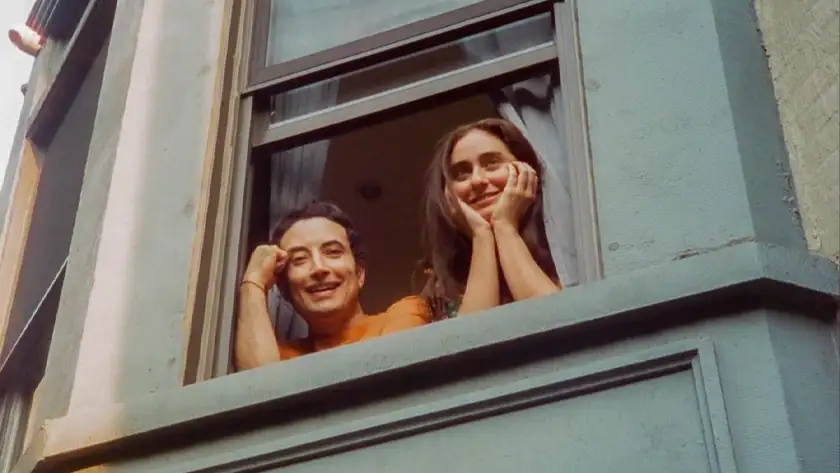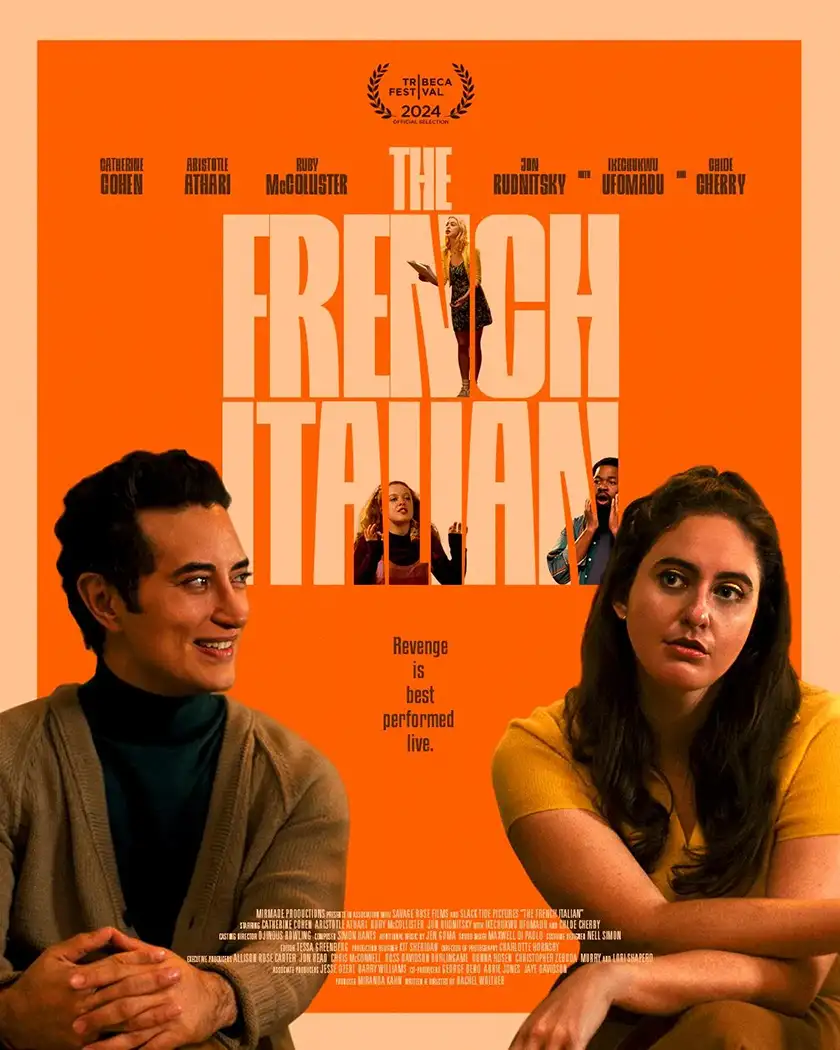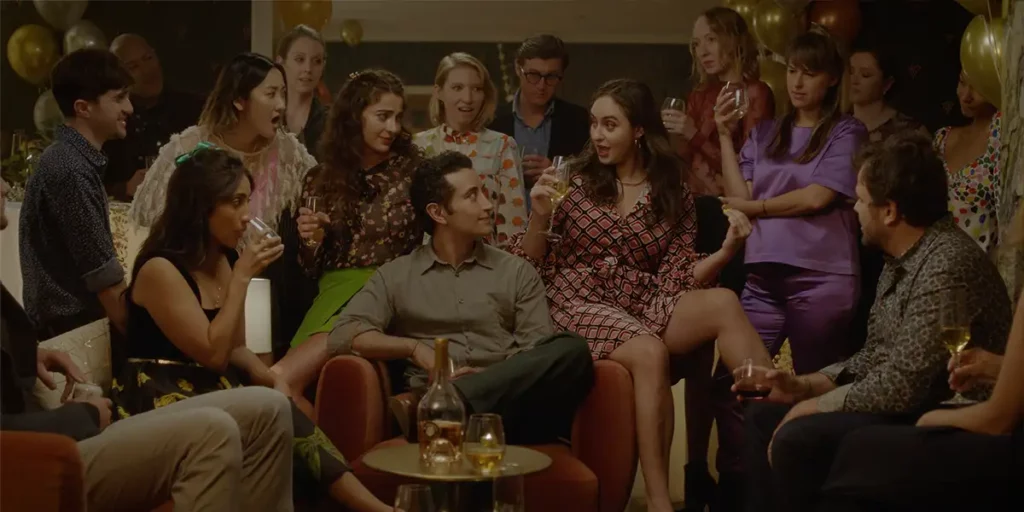The French Italian, Rachel Wolther’s feature debut, is an extraordinarily hilarious satire highlighting the lies we tell to convince ourselves we’re good people.
Director: Rachel Wolther
Genre: Comedy, Drama
Run Time: 92′
Tribeca Premiere: June 6-16, 2024
Release Date: October 3-10, 2025 (theatrical, limited); October 28, 2025 (VOD)
Rachel Wolther’s The French Italian, premiering at this year’s Tribeca Film Festival, is unlike anything you have ever seen before. It possesses a complete and total sense of identity that makes it hard to believe this is Wolther’s feature debut. With a slew of pitch-perfect performances from the entire cast, a genius script and a theatrical editing style, The French Italian is one of Tribeca’s best thus far.
The film centers on long-time couple Valerie (Cat Cohen) and Doug (Aristotle Athari). The couple live in a condo-style apartment on the Upper West Side of Manhattan where they both spend a lot of time, as Doug works from home and Valerie has recently been laid off. When their typically quiet downstairs neighbor has his girlfriend move in, Valerie and Doug’s lives are turned upside down by the young couple’s loud antics.
If they’re not screaming singing karaoke, they’re having loud fights and smashing objects around the house. While Valerie and Doug constantly complain about the absurdity of their neighbors, they secretly love to invent backstories and think up motives for the couple’s insane behavior. The wild nature of the downstairs neighbors eventually becomes too overwhelming, leading Valerie and Doug to move out of their space and into the suburbs.
After recounting events to their friends, Valerie and Doug are encouraged to try and seek revenge on their neighbors. Valerie finds out through social media the neighbor’s girlfriend, Mary (Chloe Cherry, of Euphoria), is an actress, and, in an attempt to confront her, she sends Mary an email saying she wants to cast her in an untitled play. After Valerie and Doug have Mary come in for a fake audition, they decide to take this one step further and actually put on a play where they make Mary play a horrible neighbor to humiliate her. However, through the process of creating this fake play, Valerie and Doug convince themselves they have found their true calling.

The French Italian is unlike any film I have ever seen before. On the surface, the plot is completely unique, but the further you dive into the film, the richer the story becomes. Valerie and Doug are caricatures of 30-something millennial couples who are slowly beginning to age out of the NYC scene they once felt they were a central part of. It’s the story of a couple realizing they are not, in fact, the center of the universe.
Their friends are moving on with their lives in the city, but they’ve been relegated to the suburbs, which they’ve credited entirely to their young neighbors. Their careers haven’t taken off and they probably never will. They feel like they are too young for children but that they aren’t young enough to hang out with the crowds they used to. They naively are still living in the mindset that they will achieve all their goals and lead perfect lives in a comfortably far-off time frame of “when they grow up”.
The reality, however, is that they have already grown up and, simply put, they are not where or who they want to be in life. There was no magical moment that changed them into the superstars or interesting people they thought they’d grow into. They only ever hang out with each other and therefore exist in an eco-chamber of bias confirmation. They don’t spend time with anyone who challenges their ideals and concepts of reality, so when this one-sided feud with their neighbors begins, they finally get an outlet through which to channel all their frustrations with the world.
Mary and her boyfriend are young, attractive and mysterious. They are the perfect target for Val and Doug’s frustrations because they know absolutely nothing about them. Val and Doug are obsessed with wildly speculating on who this young couple must be and the reasons they are constantly fighting. With no concrete evidence of who these people are, Val and Doug can paint them to be whoever they want them to be in order to be perfect targets for their frustrations and justify their insane scheme to humiliate Mary.
The poetic justice of the film, however, is that while Val and Doug spend so much time villanizing their young neighbors, in reality, they are the villains the entire time. Not only is their scheme borderline deranged, it is incredibly cruel. Even as the couple gets to spend more time with Mary while rehearsing the play, they never attempt to get to know her as a person but rather spend time trying to get her to admit to “crimes” she is unaware she’s even committed.
Val and Doug say Mary and her boyfriend are the reason they moved out of their gorgeous, rent-stabilized Upper West Side apartment, however, they never once tried to remedy the situation with them. They chose to move out rather than face confrontation with their neighbors. From the very first line of the film, we understand that is who Val and Doug are. They refuse to admit to any wrongdoings and lie in order to make themselves look better.

When showing up to the party where they reveal their troubles with their downstairs neighbors, they present a tray of cookies to the host the audience saw them arrange on a plate after taking them out of their packaging the store-bought cookies came in. Immediately, when handing them over, Val says they are homemade. It’s such a small moment at the beginning of the film and such an insignificant lie that it actually reveals a lot about who Val and Doug are at their very cores.
They claim these young people have ruined their lives, but they attribute any personal failures they face to this feud regardless if it is actually related to it or not. They believe themselves to be entitled to good things in life without working for them, and the ending of the movie serves them the “justice” they deserve.
The French Italian is a phenomenally told story that shines a light on the lies we tell to make ourselves feel better and the judgment we cast on others in hopes of escaping the judgment others may cast on us. Cohen and Athari are the perfect Val and Doug. Their performances perfectly encapsulate the blind spots we hold for our flaws and the self-righteous ways we may try to seek “justice” for the things we garner to be unfair. Through quick wit and original storytelling, Rachel Wolther’s film is an inconspicuously deep look at the ways we try to convince ourselves that we are not the problem.
The French Italian premiered at the Tribeca Film Festival on June 6-16, 2024. The film will be released select U.S. theaters on October 3 (in New York at the Quad Cinema) and October 10, 2025 (in Los Angeles at the Laemmle Royal, Glendale, Town Center and Noho), and on VOD on October 28.

